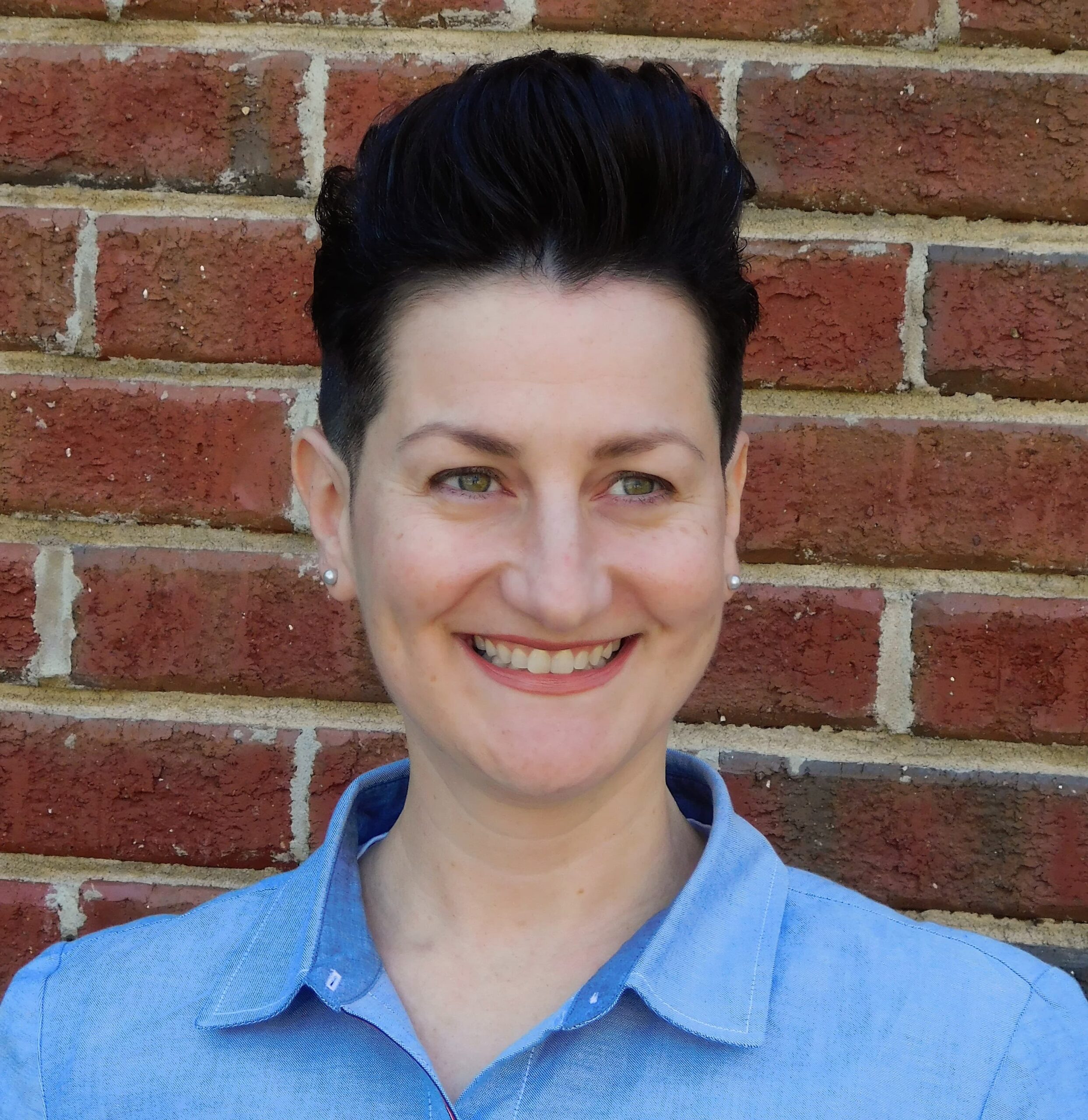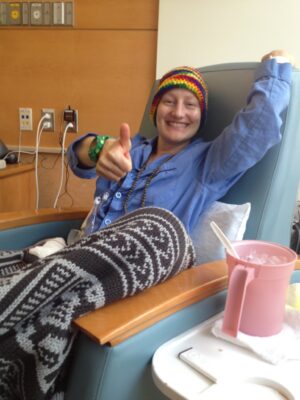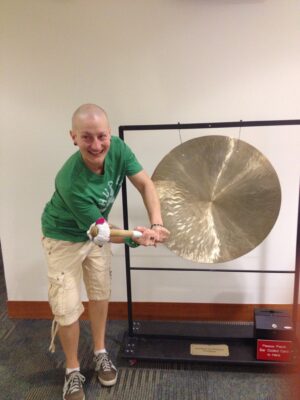
Janine Jones has one mission in her life – to be a voice for fellow cancer patients, helping others navigate their cancer journeys, through diagnosis, treatment and survivorship. Jones, 46, is a married mom from Raleigh, and didn’t expect to be on this path when she first heard she had non-Hodgkin lymphoma in 2014.
“At the time I was a CrossFit athlete, and I was in the best shape of my life,” Jones said. “I’d had a cough for a month, and thought it was allergies, and my wife said ‘you need to get it checked out.’ ”
Jones was generally symptom-free, but after one hard workout, she felt like she had a fever and the flu. After another, her chest felt tight. A nurse at the time, she thought she had strained a muscle, but using a lacrosse ball as a massage tool on her pectoral muscle made her wheeze and cough. A chest X-ray revealed a white shape; a CT scan and a biopsy confirmed it. Jones had cancer.
“They discovered it was lymphoma and was the size of a grapefruit in my chest,” Jones said. “The doctor said ‘we need to get you into the hospital, tonight or tomorrow.’ I felt scared, because there were a lot of unknowns, but I was excited because I thought we’re going to get it taken care of.”
Empowered with options, choices
 Jones was admitted to the North Carolina Basnight Cancer Hospital, the clinical home of UNC Lineberger, the next day, and it was a good thing she did. Doctors told her the cancer was pressing on the upper lobe of her lung and actually pushing her heart out of place, leaving her vulnerable to stroke.
Jones was admitted to the North Carolina Basnight Cancer Hospital, the clinical home of UNC Lineberger, the next day, and it was a good thing she did. Doctors told her the cancer was pressing on the upper lobe of her lung and actually pushing her heart out of place, leaving her vulnerable to stroke.
“I had no idea how sick I was. They told me if I didn’t treat it, I’d have two weeks to live,” she said. “That was pretty eye opening. I made the decision to fight, with everything I had.”
She was extremely impressed with her oncologist, who sat down with her, offered her information on completed lymphoma clinical trials and allowed her to think over her treatment options. “It was very empowering to me to know that I was in control,” she said.
Jones went through six rounds of chemotherapy during the next six months. She was admitted to the hospital for a week, and she endured debilitating side effects, including fevers, severe mouth sores and a blood transfusion, but she knew these were the steps she had to take to save her life.
“Through it all, I was the most positive cancer patient you’ve ever seen. I was fighting for my life,” she said.
Giving back and supporting patients
After chemotherapy, a scan revealed her cancer was down to the size of a Skittle, and she opted for radiation to finish the job. But after treatment, like a lot of patients, Jones wasn’t sure how to go back to her old way of life. She felt lost and fundamentally changed.

“You can’t go back to the old you, when you’ve had a life-threatening diagnosis,” she said. “It’s like going to battle, you’re not the same person when you get out. In cancer, you’re in a battle with yourself, and your life is changed. I now see the world in a whole new way.”
But that change in Jones prompted her to give back to others, and she joined the Patient and Family Advisory Council at the N.C. Basnight Cancer Hospital. For the past nine years, she’s dedicated herself to helping patients and their families at the hospital that saved her life, often offering the patient perspective to doctors, nurses and staff to help improve the patient experience.
“I bring the patient voice everywhere I can,” she said. “I teach the medical students, teach the new oncology nurses [how to talk to patients], and I sit in on the cancer hospital executive committee meetings to help bring the experience I had at UNC and Illustrate that as learning opportunities moving forward. I like to bring both sides of the perspective. As a former nurse and as a patient, it allowed me to learn a lot and be able to tell my story to help improve processes.”
Jones is also continuing her outreach with patients, offering advice for every step of their cancer journey. She advocates for asking as many questions as possible and having a friend or family member attend appointments to write down pertinent details that overwhelmed patients may miss.
“It’s hard to take it all in and really comprehend what’s going on day to day. It’s important to have someone you trust to be your voice when you can’t speak for yourself,” Jones said. “My wife never left my side, she was working from the hospital room. She was my rock.”
Navigating survivorship
Jones also stresses that survivorship can bring about its own set of challenges for patients and their families, including depression and other mental health issues, as well as feeling out of place. Following the completion of treatment, some cancer survivors can feel adrift because so much of their time and energy was spent fighting the disease.

“Throughout cancer you’re doing something; you’re taking action. Doing radiation, seeing a doctor, taking chemo, and then everything just drops. You’ve been so focused on this action for so long, if it stops, you’re left hanging,” Jones said. “It’s important to address that post-cancer life, and see what health care providers can do to provide guidance to survivors.”
Jones’ own experience led her to focus on her mental health, and she urges other survivors to take advantage of support groups specifically tailored to the needs of patients after cancer.
“I was the happiest patient because I was taking action, and a little while after, I’m happy to be alive, but then I went into deep depression. I didn’t know how to re-enter my life as such a changed person,” she said. “My advice is to take advantage of support groups that are really focused on survivors. I had a personal therapist that helped me figure out ‘what do I do now?’ ”
For Jones, that was an increased focus on appreciating her life and leaving behind things that didn’t suit her anymore. That meant a job change and embracing her new role as a mom. Her daughter is seven, and Jones is now traveling around the world doing sales support for clinical trial software.
“I have a deep appreciation for how short and fragile life is, and I wish I could bottle that new perspective that you gain and sell it,” she said. “I wish everyone could get that perspective without having to go through what I went through.”
